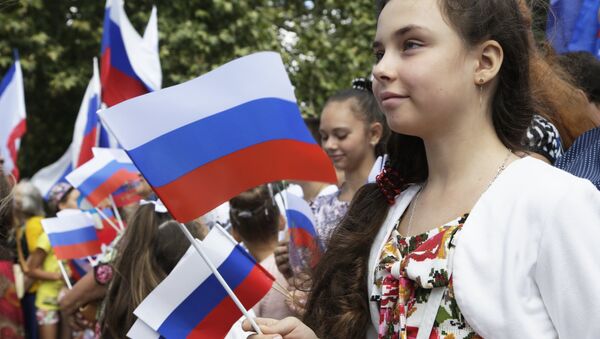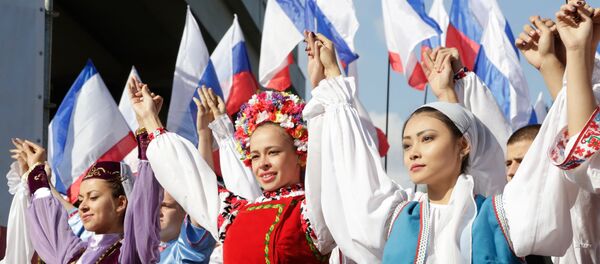However, the EU did not trail far behind the US with its own share of "sanctions craze." The European Council announced on Friday that the EU would extend anti-Russian sanctions for six months more. Ukraine, from its side, though not yet a member of the European Union, has already outdone all of its European neighbors in introducing the most sophisticated sanctions against its former region of Crimea. Ukraine's president Petro Poroshenko recently announced new sanctions targeting individual sanatoriums in Crimea, there are Ukrainian sanctions aimed at seizing the property of Crimean officials in Ukraine, etc.
Cash Withdrawals Made Possible
Russia's top leadership keeps saying that Western sanctions are regrettable, but they won't make Russia give up Crimea, as Mr. Poroshenko is demanding. But how are all of these sanctions viewed "on the ground" — inside Crimea itself? A brief trip to Crimea in June 2017 made me understand: Crimea wants to be a part of the "bigger world," but only together with Russia.
…Changes are apparent already inside the small airport in Simferopol (the capital of Crimea): unlike in 2016, it is possible to use Russian credit cards and withdraw cash using the international paying systems.
"We have been working on that and we have made cash withdrawals possible," said Andrei Melnikov, the minister of economic development of the Republic of Crimea — now the "youngest" region of the Russian Federation. "You will feel quite at home here with your VISA or Master Card."
The only difference from other Russian regions was that people withdrew cash not from the familiar Sberbank's green cash machines, but from the black cash machines of some other banks. Sberbank, apparently, decided not to subject itself to Western ire. Western visitors of Crimea, however, show more understanding for Crimea's plight than the EU officials.
"People who know the history of Crimea and Russia were not surprised by what happened here in 2014, when Crimea became a part of Russia again," explains the head of the parliamentary committee for international relations of the Republic of Cyprus, Georgios Lillikas, speaking to reporters at the recent International Economic Forum in Yalta. "I believe sanctions are not here for duration, the problem will be resolved via political dialogue. History taught us that."
How Did We Get There?
Crimea's history is indeed a troubled one. The Republic of Crimea, which is located on the ancient Crimean peninsula, has been a part of the Ukrainian Soviet Socialist Republic inside the Soviet Union in 1954-1991 and a region inside independent Ukraine in 1991-2014. After the referendum held in the aftermath of the violent regime change in Ukraine in the early 2014, Crimea came back to Russia, whose part it had been since the 1780s. Western sanctions on companies doing business in Crimea followed instantly, with numerous other limitations. For example, foreign embassies continued viewing Crimea as still a part of Ukraine, so Crimeans had difficulty getting their visas for foreign travel. In another EU-approved move, the supposedly "Western liberal" Ukrainian authorities declared "persona non grata" any Russian artist or singer who performed or exhibited his works in "occupied" Crimea, sometimes extending the prohibition to visitors from third countries too.
Reactions of the People
So, people in Crimea do have some ground for comparisons — with both old and new times. And what are the voices of the people from the land — don't they want to get back to Ukraine, as the EU and the US insist they should? In order to find out the truth I talked not only to ethnic Russians, who make up a 68 percent majority of the Crimean population, but also to the local minorities — Crimean Tatars, Jews and Greeks.
"What do you think I am — an idiot? To want Crimea go back to Ukraine?" Mikhail Degtyar, a 62 years old Crimean-born Jew and a television reporter, now sharing his time between Moscow and Crimea, is visibly emotional. "When the so called Ukrainian activists cut all electricity supplies to Crimea in the winter of 2016, women who were giving birth at the local maternity clinics were dying because the lights went off everywhere. Am I supposed to approve that? I have nothing against the Ukrainian people, but I don't want to live under a regime where such so called popular actions are permitted to happen."
Officially, the Ukrainian government did not approve of the actions of the ultra-right organizations which in autumn 2015 blew up the electricity lines connecting the Kherson region of Ukraine to "energetically insufficient" Crimea, plunging the peninsula into darkness. But the Ukrainian authorities did not do anything to remove the violent "civic activists" who prevented the lines from being repaired, beating and insulting the repair teams. These Ukrainian "civic activists" in that memorable 2015 included not only the veterans of the neo-Nazi Azov battalion and the Right Sector group, made infamous by their suppression of the population of Donbass. Electricity line poles were exploded and workers prevented from repairing them also by the activists of the Mejlis of Crimean Tatar People, an organization banned in Crimea but lionized in the West as "the true representatives of the Crimean Tatar people."
As a result, Crimea restored its electricity supplies only in spring 2016 thanks to the construction of "energy bridge" with Russia, built under President Putin's personal supervision.
Between Two Motherlands
Zaur Smirnov, currently the head of Crimea's State Committee for Interethnic Relations, was a member of the Presidium of the Mejlis of the Crimean Tatar People when Crimea was a part of Ukraine, but he broke with that organization when it "turned against its own people," in Zaur Smirnov's own words.
"I am a Crimean Tatar and I was a member of the Mejlis under Ukraine, because I wanted to serve my people," Zaur Smirnov said at a meeting with the members of Russia's Azerbaijani community in Simferopol, the capital of Crimea. "But when the Mejlis tried to leave us without light and water, how could I react? When the Mejlis' leader Mustafa Djemilev started talking about sending armed kamikazes to Crimea from neighboring Ukrainian regions — what could my attitude be, except for a very negative one? If Mejlis' leaders continue considering themselves citizens of Ukraine, let them live in Ukraine. The Mejlis' top leadership — they all have homes in Ukraine, they have been for a long time living off the grants from the Western organizations which helped the ruling regime in Kiev seize power in 2014. Let them live with the regime they helped to install. I want to live in Crimea, with my people. Thanks to Crimea's reunification with Russia, the Tatar language is now one of the three state languages of Crimea (Russian, Tatar and Ukrainian). We could never get this kind of language legislation under Ukraine."
In Ukraine, there is only one state language — Ukrainian. Russian and other minority languages are struggling for at best a regional status, which had been guaranteed to them by a special law adopted under former president Viktor Yanukovych, ousted by Maidan protest insurgency in 2014. One of the main slogans of the anti-Yanukovych protests in 2013-2014, actively supported by the US and the EU, was the cancellation of the law on regional status for minority languages. So much for Western support to language diversity.
The Good Side of Not Travelling
Most of Crimea's government members are under Western sanctions, but the head of the Republic of Crimea, Sergei Aksyonov, thinks that personal sanctions might also have a positive effect: the local officials, most of whom started their careers under corrupt Ukrainian presidents, are simply forced to stop thinking about foreign banks accounts and real estate in Europe. "Instead, they will finally concentrate on making their own neighborhoods beautiful," said former prosecutor general of Crimea Natalya Poklonskaya, a young woman popularly considered to be the prettiest victim of Western sanctions, currently working as a Russian State Duma deputy in Moscow.
That logic might work: since 2014, not a single official in Crimea had an international search warrant issued on him after making it off with public money (a very common phenomenon in independent Ukraine). During the same period, according to Crimea's head Sergei Aksyonov, Crimean economy expanded, since the Russian-speaking peninsula was no longer discriminated against.
"When Crimea was under Ukraine, the budget of our autonomous republic was limited to 22 billion rubles ($0.37 billion) in the best of times between 1991 and 2014," Aksyonov said at the international forum "Open Crimea by One's Own Eyes" held in Crimea in mid-June 2017. "In 2016, we collected in Crimea 40 billion rubles ($0.67) in taxes plus we get an annual investment of about $1.67 billion for our infrastructure, mostly from the federal budget of Russia."
Industries Revived
Pretty figures do not always reflect the dire realities of individual citizens' lives, but the interviewed Crimeans seem to agree: there are definitely more employment opportunities under Russian rule, pensions and salaries grew. There are significant improvements in infrastructure: new roads, a bridge connecting the peninsula to "continental" Russia is being in the final stages of its construction.
"Under Ukraine, we were scrambling to make a niche for ourselves at the overseas markets, but we were still losing workplaces," says Alexander Batalin, the director general of the "Fiolent" industrial plant in Simferopol, specializing in the production of high precision industrial equipment. "Now 90 percent of our products go to the Russian market, and we already have orders for the next year which are several times more lucrative than at any period of our life under independent Ukraine."
According to Batalin, Fiolent set itself the aim of filling 10 percent of the Russian market of high precision machinery. "We have to make it since the markets of Ukraine and the EU are not accessible to us," Batalin explains. "But if we achieve this goal, this will allow us not only to maintain our personnel of 1.6 thousand people, but even to expand."
Champagne for Sanctions
When Massandra, complete with its vineyards and famous 19th century wine cellars was included in the sanctions lists of both the EU and Ukraine, Yanina Pavlenko, Massandra's director general, celebrated this fact with the introduction of a new line of sparkling wines (popularly called "shampanskoye" — from the French "champagne" — in Russian).
"I am proud to be in America's list of personal sanctions," Yanina Pavlenko said in an interview to RIA Novosti news agency. "Despite all of this pressure, Massandra continues to take part in international wine competitions, and we get prizes there. This is the main thing for us. As for vacationing, I can enjoy it in Crimea. Meanwhile, California, wait for me."
So much for the Western sanctions and their "crippling" effect on Russian psyche.
The views expressed in this article are solely those of the author and do not necessarily reflect the official position of Sputnik.






